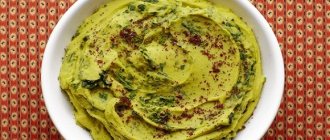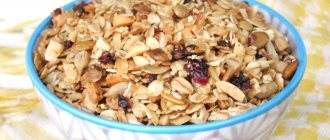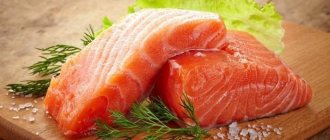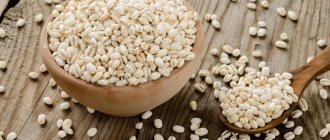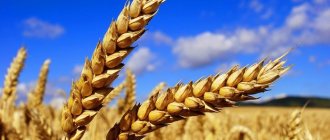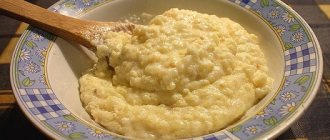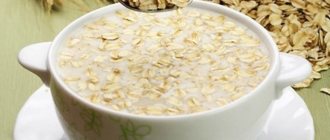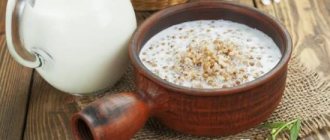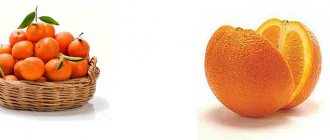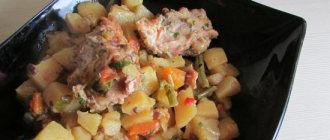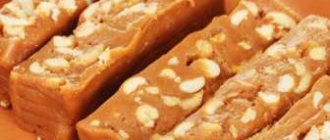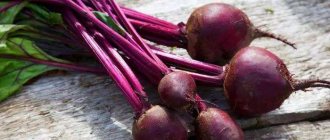Mobile app
Download our free daily calorie counting app with built-in calorie chart!
The benefits of oatmeal are difficult to underestimate: it is the protein necessary for the body, and iron, which we always lack, and low calorie content, and, of course, fiber, which allows this dish to be absorbed easily and quickly, without once again overloading and cleansing our stomach.
We are used to eating oatmeal for breakfast - this is exactly the healthy product that will charge us with energy for a long time, without harming our figure. However, even this seemingly harmless dietary dish can greatly contribute to the gain of extra pounds. In this review, we talk about the main mistakes that we often make when trying to prepare ourselves a healthy and light breakfast, turning it into a very high-calorie and not at all healthy meal.
Instant porridge production technology
Whole grains undergo multi-stage cleaning to remove debris, husks, and solid particles. Then they are flattened to a thickness of 0.3 - 0.5 mm for instant products, 0.5 - 1.5 mm for instant porridges. Notches are made on the flakes to increase throughput, speed up the cooking process, and improve properties.
After flattening, hydrothermal treatment follows - this can be steaming, welding, or irradiation with infrared rays. When the product has reached the desired condition, it is dried at high temperatures. The consistency of future food and its beneficial properties depend on the quality of the last process.
Portions too big
Breakfast, according to the famous proverb, should be eaten by yourself, but do we not follow this golden rule of proper nutrition too much, trying to eat as much as possible in the morning? Yes, you can’t skip breakfast, and it should be as nutritious and complete as possible, but by eating heavily in the morning, we overload our body, which has not yet had time to wake up and get into a working mood.
If you want to have a hearty breakfast, choose not too large portions of oatmeal: thanks to the high fiber content in the flakes, you will quickly be satisfied with a medium or even a small cup of oatmeal.
Composition and calorie content of instant porridge
Manufacturers indicate the following components on the packaging:
- rye, oat, wheat, barley, other flakes;
- salt;
- sugar;
- sweetener;
- additives – finely chopped berries, fruits, mushrooms.
There are few additional components, so they do not have a significant effect on health. The calorie content of boiled cereals is from 350 kcal: this food is harmful for people with high insulin levels. The benefits of instant porridge will result in unpleasant consequences for them.
Nutritional value and calorie content
Oatmeal, in all its interpretations, always turns out tasty and nutritious.
- vitamins B, K and E;
- minerals: potassium, phosphorus, iron, zinc, copper, manganese;
- beta-glucan (soluble fiber);
- antioxidants.
Oatmeal is rich in vegetable protein and carbohydrates, but is easily digestible. The lightness of the dish allows you to easily lose weight, and the beneficial substances in its composition help improve the health of the body.
In dry form, 100 grams of oatmeal contains 340 kcal. Amount of BZHU: proteins - 12.2 g, fats - 6.2 g, carbohydrates - 59.3 g. Since during the cooking process all cereals increase in volume, the energy value becomes less.
The calorie content and nutritional value of oatmeal vary depending on the ingredients. The distribution of BZHU and the number of calories per 100 grams of product is presented in the table:
| Type of porridge | Calorie content, kcal | Proteins, g | Fats, g | Carbohydrates, g |
| English | 25 | 1,9 | 1,3 | 12 |
| Classical | 89 | 3,1 | 4,2 | 14,1 |
| On water with/without sugar | 87/15 | 3,1/0,5 | 1,66/0,26 | 15/2,53 |
| From cereals with milk with/without sugar | 83/77 | 3,3/3,1 | 2,39/2,39 | 12/11,6 |
| With milk, butter and sugar/without | 135/118 | 4,5/3,7 | 5,1/5 | 18,5/15,2 |
| In water with butter and salt | 93 | 3 | 2,5 | 15 |
| From whole grains on water, with sugar and salt | 80,2 | 2,5 | 1,5 | 13,7 |
| Whole grain with milk | 57,3 | 2 | 1 | 11 |
| With meat | 325 | 11,9 | 17,3 | 37,5 |
| With kefir (without cooking) | 150 | 6,2 | 3,4 | 25,5 |
| Steamed | 200 | 11,8 | 7. 2 | 55 |
The caloric content and nutritional value of a dish when certain additives are added to a 100-gram portion changes as follows:
| Product (10 g) | Calories, kcal | Proteins, g | Fats, g | Carbohydrates, g |
| Apples | 23,5 | 0,2 | 0,2 | 4,8 |
| Pumpkin | 14 | 0,65 | 0,15 | 3,85 |
| Raisin | 132 | 1,45 | 0,3 | 33 |
| Prunes | 115,5 | 1,15 | 0,35 | 28,75 |
| Honey | 165 | 0,4 | 0 | 40,75 |
With the addition of every 10 grams of sugar, the number of calories in a dish increases by 10 units. For a dietary diet, it is recommended to cook oatmeal with skim milk; this will help reduce the calorie content to 10 kcal per 100-gram serving.
Instant porridges have a nutritional value and calorie content that is 5 times higher than those cooked in water.
Calorie content of instant oatmeal. Chemical composition and nutritional value.
Nutritional value and chemical composition of Instant Oatmeal.
The table shows the nutritional content (calories, proteins, fats, carbohydrates, vitamins and minerals) per 100 grams of edible portion.
| Nutrient | Quantity | Norm** | % of the norm in 100 g | % of the norm in 100 kcal | 100% normal |
| Calorie content | 370 kcal | 1684 kcal | 22% | 5.9% | 455 g |
| Squirrels | 12.1 g | 76 g | 15.9% | 4.3% | 628 g |
| Fats | 8.4 g | 56 g | 15% | 4.1% | 667 g |
| Carbohydrates | 56.1 g | 219 g | 25.6% | 6.9% | 390 g |
| Alimentary fiber | 10 g | 20 g | 50% | 13.5% | 200 g |
| Water | 8.92 g | 2273 g | 0.4% | 0.1% | 25482 g |
| Ash | 2.75 g | ~ | |||
| Vitamins | |||||
| Vitamin A, RE | 772 mcg | 900 mcg | 85.8% | 23.2% | 117 g |
| Retinol | 0.772 mg | ~ | |||
| Vitamin B1, thiamine | 0.445 mg | 1.5 mg | 29.7% | 8% | 337 g |
| Vitamin B2, riboflavin | 0.05 mg | 1.8 mg | 2.8% | 0.8% | 3600 g |
| Vitamin B4, choline | 27.7 mg | 500 mg | 5.5% | 1.5% | 1805 |
| Vitamin B5, pantothenic | 1.2 mg | 5 mg | 24% | 6.5% | 417 g |
| Vitamin B6, pyridoxine | 0.08 mg | 2 mg | 4% | 1.1% | 2500 g |
| Vitamin B9, folates | 32 mcg | 400 mcg | 8% | 2.2% | 1250 g |
| Vitamin E, alpha tocopherol, TE | 0.51 mg | 15 mg | 3.4% | 0.9% | 2941 g |
| beta tocopherol | 0.2 mg | ~ | |||
| gamma tocopherol | 0.18 mg | ~ | |||
| delta tocopherol | 0.05 mg | ~ | |||
| Vitamin K, phylloquinone | 1.9 mcg | 120 mcg | 1.6% | 0.4% | 6316 g |
| Vitamin RR, NE | 1.035 mg | 20 mg | 5.2% | 1.4% | 1932 |
| Betaine | 25.4 mg | ~ | |||
| Macronutrients | |||||
| Potassium, K | 366 mg | 2500 mg | 14.6% | 3.9% | 683 g |
| Calcium, Ca | 351 mg | 1000 mg | 35.1% | 9.5% | 285 g |
| Magnesium, Mg | 128 mg | 400 mg | 32% | 8.6% | 313 g |
| Sodium, Na | 36 mg | 1300 mg | 2.8% | 0.8% | 3611 g |
| Phosphorus, P | 423 mg | 800 mg | 52.9% | 14.3% | 189 g |
| Microelements | |||||
| Iron, Fe | 24.72 mg | 18 mg | 137.3% | 37.1% | 73 g |
| Manganese, Mn | 3.385 mg | 2 mg | 169.3% | 45.8% | 59 g |
| Copper, Cu | 360 mcg | 1000 mcg | 36% | 9.7% | 278 g |
| Selenium, Se | 23.2 mcg | 55 mcg | 42.2% | 11.4% | 237 g |
| Zinc, Zn | 2.51 mg | 12 mg | 20.9% | 5.6% | 478 g |
| Digestible carbohydrates | |||||
| Starch and dextrins | 56.65 g | ~ | |||
| Mono- and disaccharides (sugars) | 1.5 g | max 100 g | |||
| Galactose | 0.1 g | ~ | |||
| Glucose (dextrose) | 0.1 g | ~ | |||
| Lactose | 0.1 g | ~ | |||
| Maltose | 0.1 g | ~ | |||
| Sucrose | 1 g | ~ | |||
| Fructose | 0.1 g | ~ | |||
| Essential amino acids | |||||
| Arginine* | 0.839 g | ~ | |||
| Valin | 0.705 g | ~ | |||
| Histidine* | 0.285 g | ~ | |||
| Isoleucine | 0.495 g | ~ | |||
| Leucine | 0.96 g | ~ | |||
| Lysine | 0.675 g | ~ | |||
| Methionine | 0.215 g | ~ | |||
| Threonine | 0.366 g | ~ | |||
| Tryptophan | 0.18 g | ~ | |||
| Phenylalanine | 0.66 g | ~ | |||
| Nonessential amino acids | |||||
| Alanin | 0.555 g | ~ | |||
| Aspartic acid | 1.166 g | ~ | |||
| Glycine | 0.631 g | ~ | |||
| Glutamic acid | 2.73 g | ~ | |||
| Proline | 0.389 g | ~ | |||
| Serin | 0.629 g | ~ | |||
| Tyrosine | 0.38 g | ~ | |||
| Cysteine | 0.435 g | ~ | |||
| Sterols (sterols) | |||||
| Cholesterol | 2 mg | max 300 mg | |||
| Fatty acid | |||||
| Trans fats | 0.016 g | max 1.9 g | |||
| monounsaturated trans fats | 0.008 g | ~ | |||
| polyunsaturated trans fats | 0.008 g | ~ | |||
| Saturated fatty acids | |||||
| Saturated fatty acids | 1.3 g | max 18.7 g | |||
| 14:0 Miristinovaya | 0.01 g | ~ | |||
| 15:0 Pentadecane | 0.002 g | ~ | |||
| 16:0 Palmitinaya | 1.2 g | ~ | |||
| 17:0 Margarine | 0.004 g | ~ | |||
| 18:0 Stearic | 0.11 g | ~ | |||
| 20:0 Arakhinovaya | 0.01 g | ~ | |||
| 22:0 Begenovaya | 0.009 g | ~ | |||
| 24:0 Lignoceric | 0.01 g | ~ | |||
| Monounsaturated fatty acids | 2.325 g | min 16.8 g | 13.8% | 3.7% | |
| 16:1 Palmitoleic | 0.01 g | ~ | |||
| 16:1 cis | 0.01 g | ~ | |||
| 17:1 Heptadecene | 0.002 g | ~ | |||
| 18:1 Oleic (omega-9) | 2.258 g | ~ | |||
| 18:1 cis | 2.25 g | ~ | |||
| 18:1 trans | 0.008 g | ~ | |||
| 20:1 Gadoleic (omega-9) | 0.05 g | ~ | |||
| 22:1 Erucic (omega-9) | 0.005 g | ~ | |||
| 22:1 cis | 0.005 g | ~ | |||
| Polyunsaturated fatty acids | 2.533 g | from 11.2 to 20.6 g | 22.6% | 6.1% | |
| 18:2 Linolevaya | 2.448 g | ~ | |||
| 18:2 trans isomer, undetermined | 0.008 g | ~ | |||
| 18:2 mixed isomers | 0.004 g | ~ | |||
| 18:2 Omega-6, cis, cis | 2.44 g | ~ | |||
| 18:3 Linolenic | 0.072 g | ~ | |||
| 18:3 Omega-3, alpha-linolenic | 0.07 g | ~ | |||
| 18:3 Omega-6, gamma-linolenic | 0.002 g | ~ | |||
| 20:2 Eicosadiene, Omega-6, cis, cis | 0.002 g | ~ | |||
| 20:3 Eicosatriene | 0.003 g | ~ | |||
| 20:3 Omega-6 | 0.003 g | ~ | |||
| Omega-3 fatty acids | 0.07 g | from 0.9 to 3.7 g | 7.8% | 2.1% | |
| Omega-6 fatty acids | 2.447 g | from 4.7 to 16.8 g | 52.1% | 14.1% |
The energy value of instant oatmeal is 370 kcal.
Primary Source: Created in the application by the user. Read more.
** This table shows the average levels of vitamins and minerals for an adult. If you want to know the norms taking into account your gender, age and other factors, then use the “My Healthy Diet” application.
The benefits and harms of oatmeal
Oatmeal takes a leading place in the amount of substances beneficial to the human body. It contains magnesium, manganese, potassium, iron, vitamins A, B1, B2, B2, B3, B5, B6, B9, E, D, a lot of fiber, as well as easily digestible vegetable protein.
Useful properties of oatmeal:
- Keeps you full for a long time, helping to avoid unwanted snacks and spikes in blood sugar levels.
- Improves skin condition, eliminates swelling and inflammation.
- Activates the growth and strengthening of muscle mass.
- Helps cleanse the intestines of accumulated harmful substances.
- Reduces the risk of pathologies of the cardiovascular system.
Despite all the benefits of oatmeal, eating it every day is not recommended. The fact is that this porridge contains phytic acid, which binds organic calcium compounds and prevents its normal absorption in the intestines. It is better to alternate oatmeal with other types of porridge (barley, buckwheat, rice, etc.).
What's the benefit?
All grains contain a large amount of fiber, which is necessary for the normal functioning of the intestines.
There is especially a lot of it in the grain shell, so the more completely it is preserved, the flakes are more useful. In addition, each type of grain is valued for its specific nutrients. Therefore, it makes sense to alternate different types of cereals. Thus, oats are rich in the essential amino acid lysine, as well as zinc, which improves the condition of hair and skin. In addition, it contains vitamins A, B1, B2, E and selenium. Regular consumption of oatmeal helps reduce blood cholesterol levels. In folk medicine, oats are used as a natural antidepressant.
Rice, especially brown rice, contains B vitamins. It absorbs water and toxic substances from the human intestines well (the latter property is also preserved in white rice). According to some reports, regular consumption of rice without salt can increase joint mobility and cure gout.
Buckwheat is rich in iron, important for the process of hematopoiesis, and magnesium, necessary for the heart muscle. And also iodine, necessary for the proper functioning of the thyroid gland. It contains lecithin, which improves liver condition.
Millet contains silicon and copper, which are necessary for healthy skin and hair, and is a source of potassium, which supports the heart muscle.
Barley is valued for its high content of B vitamins, as well as for a special type of polysaccharide - beta-glucan. Beta-glucan helps the proper functioning of the digestive system, the formation of intestinal microflora and reduces cholesterol levels in the blood. In addition to barley, this polysarachide is present in significant quantities in oats.
Wheat contains significant amounts of vitamin E, a valuable vegetable protein.
Corn is distinguished by its high content of copper and nickel, the amino acids lysine and tryptophan. It also contains a lot of polyunsaturated fatty acids that regulate blood cholesterol levels.
Calorie content of oatmeal per 100 grams
As is known, the energy value of the original product can differ significantly from the calorie content of the finished dish. Oatmeal was no exception.
Photo source: shutterstock.com
The calorie content of dry cereal per 100 grams is 316 kcal. The BZHU indicators are as follows:
- proteins - 11.82 g;
- fats - 5.8 g;
- carbohydrates - 59 gr.
But even the most desperate will not chew dry oatmeal. Therefore, let's find out how many calories are in the finished porridge with various variations of cooking.
Do instant cereals help you lose weight?
After pouring the contents of the package into a container, you can see sugar crystals with the naked eye. For people who want to lose excess weight, nutritionists recommend limiting natural sugar and its artificial substitutes. An unjustified increase in calorie content due to fast carbohydrates has a negative impact on body weight.
The benefits and harms of instant cereals for people losing weight are obvious. The glycemic index (the effect of a product on increasing blood sugar) of oatmeal is 35 - 50, while for instant cereals it increases to - 70 - 75. There is only one verdict - semi-finished products do not help you lose weight, but harm your figure.
Interesting facts about the benefits of oatmeal
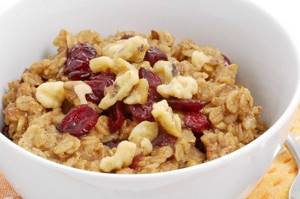
Those who are in no hurry to include a healing grain in their diet would do well to find out why oatmeal is beneficial and how its consumption affects the body. A bowl of porridge several times a week can cause the following positive changes in the body:
- improve memory and stimulate thought processes;
- replenish the supply of vitamins and minerals, which will force the immune system to perform its functions more efficiently;
- prevent the development of osteoporosis;
- normalize kidney function;
- improve blood clotting;
- give your facial skin radiance, and your hair shine and strength (for this, it is enough to use a decoction of flakes for washing your hair).
Eating porridge is very useful for residents of megacities who are forced to live in unfavorable environmental conditions. A dish made from oat grains will help cleanse the body of heavy metal salts and other dangerous and toxic components.
Oatmeal on the water
This cooking option will bring more benefits to the digestive organs.
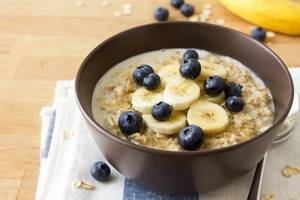
Ingredients:
- 1/3 cup oatmeal;
- 2 tbsp. water.
Preparation:
- To boil water.
- Pour the cereal into boiling water.
- Cook the porridge over medium heat (stir from time to time with a spoon) for 8-10 minutes.
- Add salt and 2 tbsp. l. butter.
- Before serving, add honey, walnut kernels, fresh or frozen fruit (they should be thawed first).
Not everyone likes the taste of porridge cooked in water. If you replace water with milk, the taste of the dish will improve significantly. But do not forget that the number of calories contained in such a dish will be much greater - more than 110 kcal per 100 g. To eat delicious porridge and not gain weight, you can use this secret: dilute the milk with water, and also reduce the dose of sugar and butter.
What is the composition and calorie content of “porridge for healthy people”?
There is an opinion that eating a bowl of oatmeal for breakfast means getting a boost of energy that will last for the whole day. Is it really? An indicator that will help you accurately understand whether oatmeal is really healthy is calorie content .
Nutritionists have calculated that a 100 g serving of oatmeal contains 345 kcal. This is a valuable low-calorie food product. A big plus is the high protein content - 16.86 g. The amount of carbohydrates in this cereal is even higher - 66.27 g, which cannot be said about fats - 6.9 g.
Oatmeal contains iron (4.72 mg), zinc (3.97 mg), copper (630 mg), magnesium (177 mg), potassium (429 mg), phosphorus (532 mg) and many other useful components , which ensure the growth process and strengthen the body.
Oats are a true champion among cereals in terms of the content of enzymes that help cleanse the body of toxins. The grains of this plant are rich in phospholipids. These substances effectively normalize metabolism. It is enough to eat just 100 g of oatmeal to get three daily norms of vitamin B1 and ½ of vitamin B2.
Oatmeal with milk
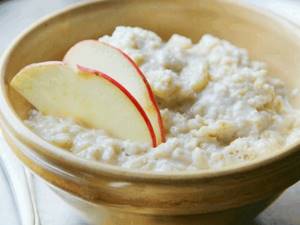
Ingredients:
- 1/2 tbsp. oatmeal;
- 1-1.5 tbsp. milk;
- salt - to taste;
- honey or 1.5 tbsp. l. Sahara;
- fruits, berries.
Preparation:
- Sort the flakes and rinse with cold water.
- Pour milk into a saucepan and bring to a boil.
- Pour the cereal into boiling milk.
- Cook for 7 to 10 minutes.
- At the end of cooking, add salt, honey or sugar.
The dish will become even tastier if you diversify its composition with fruits or berries.
